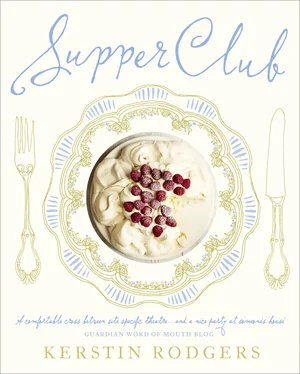Is all this a rejection of overpriced formal restaurants? I liken the home restaurant phenomenon to the punk revolution of 1976. At that time, young people had become frustrated with mega-rich pop stars escaping to America to become tax exiles, hanging out with Princess Margaret on the island of Mustique, and creating concept albums filled with meandering songs. (Pop is, after all, a grassroots movement in which talented people from humble beginnings can ascend the social ladder.) Young people wanted three-minute pop tunes and bands playing local venues for which they could afford tickets. Punk was born.

Most celebrated chefs today are media creatures, for the most part male, and rarely behind the stove of the restaurant that bears their name. Cooking professionally is hard work and long hours, for little pay. Bullying is rife in the industry, both physical and psychological. Even the names, the rankings – chef de rang, chef de partie – have their roots in the army. The glory of cooking in a professional restaurant lies only in repeat bookings and murmurs of ‘My compliments to the chef.’

Like dinosaur prog rockers from the 70s, ‘sleb’ chefs have sometimes turned their backs on the audience. Chefs can make more money from TV shows, cookbooks and endorsed cookware than from their restaurants. Like haute-couture fashion houses, the money is not in the clothes but in the merchandising, the perfume. Like women’s magazines, the gloss and the perfect lifestyle of today’s cookbooks can both inspire aspiration and depression.
For me, my Underground Restaurant is a chance to put into practice some of my political ideals: do-it-yourself culture, making good food available to everyone at a reasonable price, improving the image of vegetarian food. I am probably the only restaurant in the world that reserves cheaper seats for the unemployed, people on benefits, those who may not be able to afford to eat out.
Unlike France, Italy and Spain, there exists a culinary apartheid in Britain. Poorer people are confined to ethnic restaurants, fast food and chains when eating out. London is one of the most expensive cities in the world in which to eat out and most people simply can’t afford to eat at good restaurants. Our food markets, while improving, do not offer the freshness, affordability and diversity of European street markets. A home restaurant in every neighbourhood could be a route to change, raising the status of home-cooked food.
Trust is also important. Many commercial restaurants simply cannot be trusted to provide cooked-from-scratch fresh food or meals for special diets. I cheffed in a ‘vegetarian’ café at festivals that served bacon sandwiches in the morning because they were such a money spinner. The bacon and the vegetarian food were regularly cut up on the same chopping boards, prepared with the same knife. But the fashion for food intolerances can drive the home chef up the wall, too.
Some customers like the idea of exclusivity. Food blogger Krista of Londonelicious describes the appeal for her:
‘I went to Bacchus, but chef Nuno Mendez did not come to the table to personally describe each dish as he did at The Loft. This is way more special.’ This exclusivity comes at a price, though… £120 per head.
Other guests love the idea of illegality, the notion that they could get busted. It’s not so much extreme sport, but the thrill of extreme dining. I have to admit, I do play up this aspect. Guests are asked to memorise a password before they can enter. I tell them that if we get raided by the police, start singing Happy Birthday! (In reality I’ve had policemen come as guests and they don’t have a problem with it!) It evokes memories of the 1920s prohibition era, as does the Argentinean term for underground restaurants, puertas cerradas – ‘closed door restaurants’.

A SUPPER CLUB IS A CHANCE TO CATAPULT YOURSELF INSTANTLY TO THE POSITION OF CHEF/PATRON:
…if you are too old or have too many family commitments to work your way through the ranks.
…if it is too late to go to catering college, to train via the accepted route.
…if you just want to cook part time, want a practice run before you open a mainstream restaurant.
…if you lack the finances to rent a premises, hire staff, enter into contracts with suppliers.
…if you have discovered, like me, rather late in the day, that this is where your heart lies.
Open an underground restaurant. I double-dare you…
The Story of MsMarmiteLover
I’ve always cooked. I remember the first dish: I was at nursery school and we baked chocolate butterfly cakes. Even all these years later, I remember how incredibly pleased I was with myself. It seemed a magical process. The trick of removing the top of the cake and cutting it in half to make wings was unbelievably cool. I became obsessed with cakes for a while after that. I’d get up early before my parents awoke and get busy cake-mixing. One day I decided to go a step further and turn the oven on. At 6 a.m. my parents awoke to the smell of burning plastic – I’d decided to bake my cake in a red plastic bowl. My mum came downstairs and opened her brand new oven; the red plastic was dripping through the bars of the rack. ‘You can’t heat up plastic!’ she cried. And for a while, that was the end of my baking career.


At the age of eight I was given a copy of Good Housekeeping’s Children’s Cookbook, which gave step-by-step instructions in black-and-white photographs of how to make a cup of tea or toast a slice of bread. Many of the instructions started with ‘First comb your hair…’ From this I learnt how to make macaroni cheese, fudge, peppermint creams and coconut ice.
When I was 15, I got a Saturday job at WHSmith. A new series of magazines had come out: Supercook. As staff, I got a ten per cent discount. Every week, a copy of Supercook was set aside for me, illustrated with typically 70s food photography showing wood-varnished chickens and earthenware pots. The colour brown was big in the 70s. Three months into the subscription, I made a Sunday lunch for the family, from Supercook recipes. As the series was in alphabetic order – a letter a month – I’d only got up to ‘C’, which limited the menu to…Cabbage, Chestnut stuffing, Chicken, Chocolate mousse.
Eventually I got the sack from WHSmith. Not for my punky spiked green and blue hair (to match the uniform, I was pushing the brand!) but for lateness. This meant that my Supercook issues stopped at ‘R’. I could not cook dishes starting with the letter ‘S’.
This didn’t deter me. I hosted a dinner party for a guy I thought fancied me. My menu was sophisticated: grilled grapefruit halves with glacé cherries, spaghetti bolognese (the only thing beginning with ‘S’ that I knew how to cook) and baked apples with custard. I had 12 guests, a ridiculously large amount for a 15-year-old. Grilling the grapefruits took forever and the main course didn’t get served until 11 p.m., by which time I was exhausted and drunk. Then my friend Clare kissed the object of my affection, a cocky guy with a mullet, whose millionaire father owned a plastic-bag factory. Story of my life: I’m sweating in the kitchen, imagining that my beautiful food would attract soul mates, while my friends are outside, wearing platforms, face glitter and flicked-up fringes, getting some action. What idiot came up with that phrase, ‘The way to a man’s heart is through his stomach’? It’s so not true.
Читать дальше

















